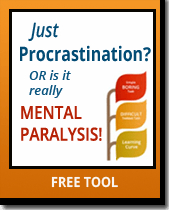A study on teens says it does!
The weather this March has been so weirdly warm and beautiful in the northeast that it makes me want to just get in the car and drive! Music blaring, windows open, top down, my inner teenager wants to emerge. Perhaps it was the good driving weather this week that prompted the March 27 New York Times article, “Learning to Drive with A.D.H.D.”
 The article cited sobering statistics about ADD / ADHD and driving. According to a 2007 study conducted by Dr. Russell Barkley and Daniel Cox, “young drivers with A.D.H.D. are two to four times as likely as those without the condition to have an accident – meaning that they are at a higher risk of wrecking the car than an adult who is legally drunk.”
The article cited sobering statistics about ADD / ADHD and driving. According to a 2007 study conducted by Dr. Russell Barkley and Daniel Cox, “young drivers with A.D.H.D. are two to four times as likely as those without the condition to have an accident – meaning that they are at a higher risk of wrecking the car than an adult who is legally drunk.”
Why are ADD teens at higher risk? The factors involved are the usual bugaboos of ADHD: poor attention, impulsivity, multi-tasking, increased risk-taking, coupled with the increased difficulties some ADD teenagers may have in learning to drive in the first place. While this particular article focuses on teenagers, we ADD / ADHD Adults know that we never really outgrow our symptoms. With maturity, hopefully, comes increased self-awareness. As adults, we should be more cognizant that cell phones and texting increases our distraction and avoid using the devices while driving.
Individuals with ADD differ dramatically
As someone who has been driving for 40 years without ever getting a ticket, I know how much individuals with ADD can differ from each other. I'm also painfully aware of my own inability to focus on the road when I'm on a cell phone. I had one of the first “car phones” back in the 1980's, but quickly found that I could NOT actually talk on it while driving! My friends know that I'm notorious for missing where I'm supposed to turn if I'm chatting with someone in the car with me. So my ADD is obviously operating here — perhaps the difference between me and an impulsive teenager is that I'm consciously aware of my limitations and behave accordingly.
Dr. Barkley advocates that ADD medication be mandatory for ADD / ADHD teenagers who drive. Yet his position doesn't take into account our ability to hyper-focus as well as to get distracted. I would think that some of us may hyper-focus on driving when we're behind the wheel, and actually be better drivers than the average.
Another thing to consider in this study is that the teens who were included as having Attention Deficit Disorder were those who had been diagnosed. But the majority of those with ADD / ADHD are NOT aware that they have the condition, especially as mature adults. So there may be many out there who are not actually problem drivers, but weren't counted in the statistic.
Increased awareness of the risks for ADD drivers can have a downside if we don't account for individual differences. Consider some possible ramifications of taking ADD / ADHD into account when it comes to driving. It raises some important questions:
- Do we want ADD / ADHD teenagers to be identified as such when they get their license?
- Should medication for driving teens be mandatory, as Dr. Barkley suggests?
- Could being identified as ADD / ADHD raise our insurance rates, even if we've never had an accident?
Is anyone else out there just a little bit nervous about society acting on this study?





Matthew
Obviously i wouldn’t want to pay more for insurance, based on some bogus risk profile that takes only a narrow view of ADHD and its effects into account, but i can honestly see some benefit to making the testing for ADD/ADHD mandatory prior to qualifying for the licence test. In my country ADD /ADHD is still a highly undiagnosed condition, and many people wander through life with no idea why they struggle to be “like everyone else”. Diagnosing the issue would go a long way to helping people deal with their ADD/ADHD related strengths and weaknesses, both when it comes to driving and life in general.
Bonnie Mincu
Yes, it’s certainly a complex issue. People who are much more likely to be distracted while driving should be aware of this, but it is not accurate to say that everyone with ADD / ADHD is predestined to be a poor driver.
Of course, there are also poor drivers who are not ADD… and texting while driving is clearly dangerous for anyone.
Lisa
As a ADHD-diagnosed, safe driver for more than forty years, I’m more than a little bit nervous. Whereas my ADHD has gotten in the way of school performance and job performance on many occasions, it never seems to have interfered w/my ability to drive safely.
Bonnie Mincu
I’m with you here. Driving safety hasn’t been a problem for me. Keeping my whole house clutter-free… now that’s where my ADD shows up more!
Kim
I think it is appalling to think of mandatory testing/medication for ADD/ADHD teen drivers. 1984’s Big Brother has more than arrived. The frightening thing is that we’re doing it to ourselves!! Mandating medication is an outrageous infringement on my personal rights.
I have found my ADD to be a distinct ADVANTAGE when I am driving. I notice other drivers making moves before they signal, I can sense traffic that I can’t quite see. It is important to be cognizant that my focus should be JUST on my driving, however, and not on the other things that distract from that such as cell phones, eating, even talking as you say, Bonnie. I think of it more as being mindful of my purpose while in the car – to drive and arrive safely.
I hope someone writes about the ADD Advantage like the Eides’ did for Dyslexia. This is NOT a deficit; my brain just works differently from ordinary (boring) folks. Yea me!!! (and the other ADD/ADHDers out there!! – WE ROCK!!!!)
Bonnie Mincu
Kim, you said it. MINDFULNESS is the key. Of course, teens in general aren’t as skilled at being mindful, and that’s the crux of the problem.
Aside from the scary “Big Brother” implications of demanding medication, there are some people whose metabolism simply can’t tolerate it. I’d rather there be strong laws against anyone texting while driving, which would cut out a lot of accidents for drivers of all ages.
Regarding the topic of ADD as an advantage, we are more likely to be creative problem solvers, great in a crisis, and at an advantage when split-second hyper-focus is required. Of course these advantageous traits differ from person to person, the same as the more problematic ones.
Barbara
Where I drive and the driving conditions make a difference in how much my ADD affects my driving. I love “going for a drive” on country roads, with little traffic and not a lot of pressure to get somewhere. And I was interested to discover that I drive pretty well on highways and in traffic when I know where I’m going and have the radio on. But being unsure of my route — having to watch closely for often ill-marked or nearly invisible signs — makes me very anxious and more likely to make rash driving decisions. Also, carrying on a serious conversation that requires qualitative thinking makes my driving erratic — as if just don’t have enough attention for both. I prefer a passenger who can either navigate for me or enjoy the radio with me! And my worst driving experiences have been on the highways around Washington, DC — a rabbit warren of roads with as many as 6 lanes one direction, confusing signs in very quick succession, and heavy, fast traffic. Nightmarish.
But I’m not sure I’d mandate drugs for ADD drivers, simply because the drugs can carry other risks and there are other ways to manage the disorder. But maybe ADD testing for all drivers.
Lisa
One more comment – I actually find that driving in Manhattan traffic is enjoyable (!) possibly because a signature symptom of my ADHD is the tendency to pay attention to everything, all the time. Driving in “the city” is stimulating, and feels like I’m in the midst of a 3D video game. 🙂
Bonnie Mincu
I bet your hyper-focusing ability makes you a better driver than most NYC drivers. A lot of New York taxi drivers seem to think they’re in a video game.
Mike
I fail to see why hair color, gender or ADD should be tested when getting driving license. Ability to drive a vehicle should be tested (in stressful, multitask etc. conditions).
Because some fascistic idiot has decided ADD is not allowed in my line of work I have to lie about my ADD in variety of test to do what I do well.
Bonnie Mincu
Yes, I have had clients in professions where unthinking prejudice makes no sense. It’s ironic because often those are professions where a lot of people are ADD, probably undiagnosed, and their ADD traits may be an asset for them.